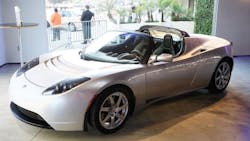VW Settlement Will Support Tesla, Toyota, GM Technology
Volkswagen's $15 billion settlement with the U.S. and California over cheating on diesel emissions includes billions of dollars to support technologies sold by rivals such as Tesla Motors Inc. and Toyota Motor Corp.
As part of the deal, VW will pay $2 billion over 10 years to promote clean cars such as those powered by hydrogen and electricity. To mitigate pollution created by the cheating cars, the company also will pay $2.7 billion over three years that will, in part, be used to give incentives to replace polluting heavy-duty diesel vehicles with newer trucks that have cleaner emissions. With its MAN and Scania brands, VW is Europe’s third-largest heavy-truck maker.
“You’re looking at $15 billion but you’re also going to have reputational damage and possibly lost market share because the money will promote technologies made by other companies,” said Maryann Keller, an independent auto industry consultant in Stamford, Connecticut.
The $2 billion portion of VW’s settlement will help competitors the most. In California, for example, it will be used to promote zero-emission vehicles, to support development of hydrogen filling stations and electric-car charging stations, and to encourage ride-sharing services that use non-polluting vehicles.
VW doesn’t operate a ride-sharing business in the U.S. The German brand said it sold 1,207 electric-powered Golf small cars in the country through the first five months of the year, while Nissan Motor Co. sold almost 4,700 Leaf electric cars.
EV Leaders
VW does plan to introduce several electric vehicles, but key rivals are further down that road. General Motors Co. aims to sell the electric Chevrolet Bolt at a starting price of about $30,000 after federal tax credits late this year. Next year Tesla plans to start selling the much-ballyhooed Model 3, which is supposed to start around $35,000 before credits. Those cars and Tesla’s existing Model S and Model X electric models can get more than 200 miles (322 kilometers) of range per charge, addressing a criticism of early battery-powered cars.
Chevrolet’s Volt plug-in hybrid car also qualifies as a zero-emission vehicle under the agreement because it has more than 35 miles of electric range.
Toyota is selling its Mirai fuel cell car in California and Honda Motor Co. plans to bring its Clarity hydrogen car to the U.S. this year. Fuel cells strip electrons from hydrogen, generating electricity to charge the battery that powers the car. Both cars can go at least 300 miles on a full tank of hydrogen.
The ride-sharing support also benefits rivals. GM, which owns 9% of ride-sharing firm Lyft Inc. and has its own car-sharing services called Maven, has been experimenting with autonomous versions of the Bolt with an eye toward using the electric car in those mobility services.
All in all, California gets $1.18 billion of the $4.7 billion in funds to encourage cleaner technologies, making the state a big winner in the settlement. California regulators held 10 meetings with VW officials to extract the admission that the automaker had developed and installed defeat devices to trick emissions tests.
“This landmark agreement not only ensures that consumers who were deceived are fairly compensated, but also requires Volkswagen to make unprecedented investments in protecting our environment and advancing zero-emission technology,” California Attorney General Kamala Harris said in a statement.
About the Author
Bloomberg
Licensed content from Bloomberg, copyright 2016.
